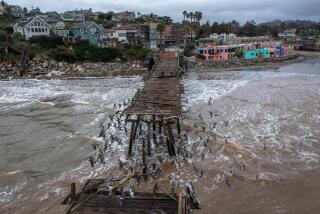With Erosion Taking Its Toll, Maybe There <i> Won’t</i> Always Be an England
- Share via
MAPPLETON, England — Retirees Dot and Jack Meggitt hope their house won’t fall into the sea before they die. But it might.
Just 20 yards from the fastest eroding coast in Europe, the couple’s cliff-top bungalow perches on land that is being eaten by the North Sea at a rate of two yards a year.
Thirty miles up the coast, the elegant 110-year-old Holbeck Hall Hotel in the Yorkshire resort of Scarborough slipped spectacularly down a cliff this month, taking with it antiques and guests’ possessions.
After years of futile battle, the government has decided to virtually surrender to the waves that have claimed 36 villages since Roman times on the 25-mile Holderness Coast where the Meggitts live.
With help from the European Community and prodding by a media campaign, the government did build a sea wall in an effort to save the 106 residents of Mappleton. But other communities are being abandoned because they are considered too small to merit expensive and short-lived coastal defenses.
The violent North Sea undermines the cliffs at Holderness, on England’s northeast coast, and the weight of material above triggers cliff slides, said Dr. John Pethick, a coastal geomorphologist at nearby Hull University.
The cliffs are formed of a combination of sandstone, gravel and mud which make them highly vulnerable to the elements, he said.
Pethick believes efforts to stop the coastline’s retreat prevent sediment from reinforcing shores further south and across the waters in continental Europe.
“The erosion is a very bad thing for Holderness but a very good thing for countries such as Germany, Denmark and the Netherlands,” he said. “Whole cities are built on this (beach material) on the other side of the North Sea.”
The Holderness Coast is the North Sea’s largest source of sediment. Each year 35 million cubic feet is dragged by the currents southward, down the coast or out into the North Sea.
Tactics to combat erosion include sinking barges and old tires encased in concrete at intervals along the coastline, as well as the more traditional breakwaters.
History has shown that no British sea defense has lasted more than 50 years. But even short-term protection is denied to most of the coast.
Dot Meggitt doubts that the 10-ton granite sea wall, built in 1991 for $2.6 million, will protect Mappleton, which she campaigned for years to save.
Relatively calm weather since the construction of the barrier means its strength has not been tested, she said.
“All it takes is one big storm, and that will come eventually,” she added, predicting such a storm within the next five years. “We’re not celebrating yet.”
When the Meggitts moved into their house 38 years ago, an army camp and a soccer field lay on the 500-yard stretch that separated it from the marauding sea. These have long since vanished into the waves.
Eddie Knapp, chief engineer at Holderness Borough Council who oversaw the Mappleton sea wall, conceded that humans can never win their battle against the North Sea.
“But it’s everyone’s duty to be parochial about their coastline,” he said.
Knapp said homeowners at risk are unable to buy insurance and receive no compensation when their homes tumble into the sea. But he expressed little sympathy for those aware of the risks who purchased their property dirt-cheap.
Efforts to save the British coastline are bad news for European countries, Pethick said.
“It’s essential that this material moves across to the other side of the North Sea so they can keep pace with the rising sea levels,” he said.
Scientists say sea levels have been rising worldwide in the last century by four to eight inches per year as land ice melts and the oceans expand.
Since Pethick believes other EC countries are the beneficiaries of British land, he suggests that Britons look to the EC for compensation.
Mappleton received an EC grant for its sea wall, but the area--a bleak, wind-lashed cluster of 26 houses, one shop and a church--had to be marketed as a tourist attraction to qualify for the money, to the Meggitts’ horror.
More to Read
Sign up for Essential California
The most important California stories and recommendations in your inbox every morning.
You may occasionally receive promotional content from the Los Angeles Times.










